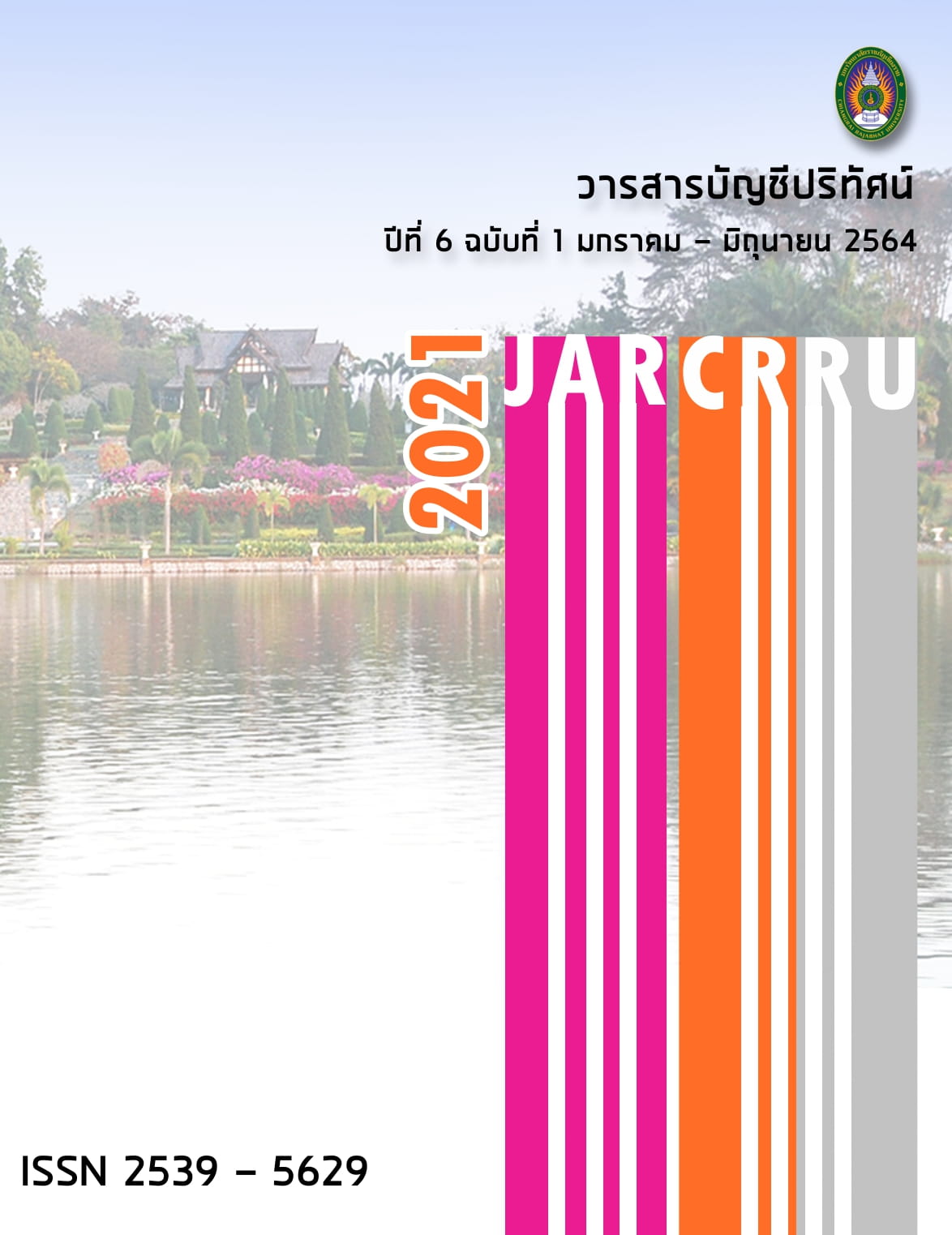อิทธิพลของผู้สอบบัญชีระดับสากล ผู้สอบบัญชีอุตสาหกรรมพิเศษ ที่มีต่อการจัดการกำไรของบริษัทที่จดทะเบียนในตลาดหลักทรัพย์แห่งประเทศไทย
คำสำคัญ:
ผู้สอบบัญชีระดับสากล, ผู้สอบบัญชีอุตสาหกรรมพิเศษ, การบริหารกำไรบทคัดย่อ
การวิจัยครั้งนี้มีวัตถุประสงค์เพื่อศึกษาและวิเคราะห์ความสัมพันธ์ระหว่างผู้สอบบัญชีระดับสากลผู้สอบบัญชีอุตสาหกรรมพิเศษที่มีต่อการบริหารกำไรของบริษัทที่จดทะเบียนในตลาดหลักทรัพย์แห่งประเทศไทย โดยใช้ข้อมูลเพื่อศึกษาในช่วงปี 2559 – 2561 รวม 3 ปี จำนวน 435 บริษัท สถิติการวิเคราะห์ความถดถอยแบบพหุคูณ
จากการศึกษาพบว่า ความสัมพันธ์ระหว่างผู้สอบบัญชีระดับสากล ผู้สอบบัญชีอุตสาหกรรมพิเศษมีความสัมพันธ์เชิงลบการบริหารกำไรอย่างมีนัยสำคัญ แสดงให้เห็นว่า หากกิจการมีการตรวจสอบโดยผู้สอบบัญชีที่เป็นระดับสากล ผู้สอบบัญชีอุตสาหกรรมพิเศษจะไม่มีการบริหารกำไร ดังนั้นจึงเป็นเหตุผลสนับสนุนเพื่อการวิเคราะห์ในการลงทุน การเจริญเติบโตของธุรกิจควรมุ่งเน้นความเชื่อถือได้จากข้อมูลที่นำเสนอรายงานทางการเงิน ซึ่งผ่านการตรวจสอบโดยผู้สอบบัญชีระดับสากลและผู้สอบบัญชีของอุตสาหกรรมพิเศษ เป็นประเด็นสำคัญ
เอกสารอ้างอิง
วรศักดิ์ ทุมมานนท์. (2543). คุณรู้จัก Creative accounting และคุณภาพกำไร แล้วหรือยัง?. กรุงเทพมหานคร: บริษัทไอโอนิค อินเตอร์เทรด รีซอสเซส จำกัด.
Basu, S., (1997). The conservatism principle and asymmetric timeliness of earnings, Journal of Accounting & Economics. 3-37.
Carslaw, C. A. P. N., & Kaplan, S. E. (1991). An Examination of Audit Delay: Further Evidence from New Zealand. Accounting and Business Research. 21-32.
DeAngelo, L. (1986). Accounting Numbers as Market Valuation Substitutes: A Study of Management Buyouts of Public Stockholders. The Accounting Review 61. 113-144.
Febriela Sirait Sylvia Veronica Siregar. (2014). Dividend payment and earnings quality: evidence from Indonesia. International Journal of Accounting and Information Management. 22 (2). 103 – 117.
Frank Ecker. (2016). Analysts’ Earnings Adjustments and Changes in Accounting Standards. Duke University
Healy, P. M. (1985). The Effect of Bonus Schemes on Accounting Decisions. Journal of Account and Economics. 85–107.
Jennifer Francis. (2008). Voluntary Disclosure, Earnings Quality and Cost of Capital. Journal of Accounting Research. 46 (1). 85-92.
Jnes, J. (1991). Earnings Management during Import Relief Investigations. Journal of Accounting Research. 193-228.
K. Raghunandan and D. V. Rama. (1999) Auditor Resignations and the Market for Audit Services. AUDITING: A Journal of Practice & Theory: 18 (1). 124-134.
Karla M. Johnstone. (2000) Client‐Acceptance Decisions: Simultaneous Effects of Client Business Risk, Audit Risk, Auditor Business Risk, and Risk Adaptation. AUDITING: A Journal of Practice & Theory: 19 (1).1-25.
Karla M. Johnstone, Jean C. Bedard. (2004) Audit Firm Portfolio Management Decisions. Journal of Accounting Research. 42(4).78-99
Mark L. DeFond, Chee Yeow Lim, and Yoonseok Zang. (2016) Client Conservatism and Auditor-Client Contracting. The Accounting Review. 91(1). 69-98.
Muhammad Nurul Houqe. (2010). The effect of IFRS Adoption and Investor Protection on Earnings Quality around the World. School of Accounting & Commercial Law Victoria University of Wellington Wellington, New Zealand.
Naomi S. Soderstrom. (2007). IFRS Adoption and Accounting Quality: A Review. European Accounting Review.16(4). 675–702.
Nilabhra Bhattacharya. (2013). Does Earnings Quality Affect Information Asymmetry? Evidence from Trading Costs. View issue TOC .Volume 30, Issue 2. pp. 482–516.
Palmrose. (1986). Audit Fee and Auditor Size – Further Evidence. Journal of Accounting Research.24 (1) 97-110.
Ralf Ewert. (2013). Accounting Standards, Earnings Management, and Earnings Quality. University of Graz, Universitaetsstrasse 15, A-8010 Graz. Austria
Ray Ball. (2004). Earnings quality in UK private firms: comparative loss recognition timeliness. Journal of Accounting and Economics .39(1). 83–128.
Steven Balsam. (2003). Auditor Industry Specialization and Earnings Quality. Auditing: A Journal of Practice & Theory, 46-65.
Teoh, S. H., & Wong, T. J. (1993). Perceived earnings auditor response quality and the coefficient. The Accounting Review, 68. 346–366.
ดาวน์โหลด
เผยแพร่แล้ว
รูปแบบการอ้างอิง
ฉบับ
ประเภทบทความ
สัญญาอนุญาต
ลิขสิทธิ์ (c) 2023 มหาวิทยาลัยราชภัฏเชียงราย

อนุญาตภายใต้เงื่อนไข Creative Commons Attribution-NonCommercial-NoDerivatives 4.0 International License.
ต้นฉบับที่ได้รับการตีพิมพ์ในวารสารบัญชีปริทัศน์ มหาวิทยาลัยราชภัฏเชียงราย ถือเป็นกรรมสิทธิ์ของมหาวิทยาลัยราชภัฏเชียงราย ไม่อนุญาตให้นำข้อความทั้งหมดหรือบางส่วนไปพิมพ์ซ้ำ เว้นเสียแต่ว่าจะได้รับอนุญาตจากมหาวิทยาลัยราชภัฏเชียงราย เป็นลายลักษณ์อักษร



